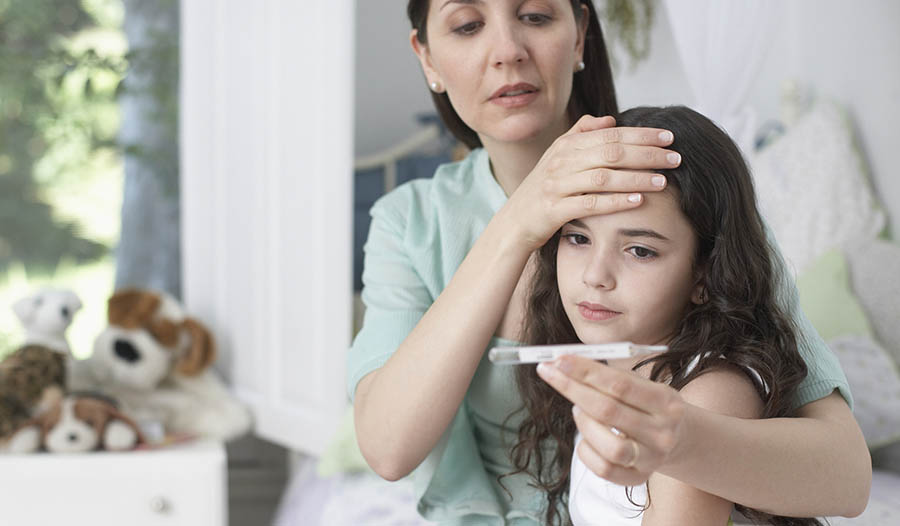How to Manage the Dreaded Stomach Bug in Children
DISCLAIMER:This blog does not intend to provide diagnosis...

Acute Gastroenteritis (AGE) in children, commonly referred to as the “stomach bug” by frustrated parents everywhere, is most often caused by a short list of viruses. The usual suspects in this illness each have their own peak incidence during the year but can also be found in random outbreaks.
Norovirus
This virus occurs year-round, but also has been known to cause sporadic cases, generally in young children. It is characterized by persistent vomiting.
Rotavirus
This was the most common cause of AGE in young children until the introduction of the rotavirus vaccine in 2006. Since vaccination began, the presence of rotavirus illness has decreased up to 90% each year leaving norovirus the top player in the AGE realm. It peaks in fall/winter in temperate climates, and is seen most often in young children. Rotovirus causes severe diarrhea, especially in young infants and children.
Adenovirus
Primarily affecting children under the age of 4, it peaks in the summer but can cause illness all year.
Sapovirus and astrovirus
Both viruses affect young children and infants. It occurs year-round, and is a milder illness than rotavirus or norovirus.
Symptoms of Acute Gastroenteritis in Children
Symptoms of AGE vary by age, from person to person, and from day to day, but the two most common are:
- Diarrhea: Frequent, watery or loose stools are caused by injury to the intestine with AGE. Stool may contain mucus or blood, but usually does not. Diarrhea may last a week or more, causing fluid and electrolyte losses.
- Vomiting: Over half of children with AGE experience vomiting, which can also cause fluid and electrolyte loss. Vomiting usually lasts for 1-2 days.
Other symptoms can include fever, crampy abdominal pain, muscle aches, fatigue, loss of appetite and runny nose or sore throat. The first infection with one of the usual suspects generally results in the most severe or prolonged illness, which is why young infants and children tend to have the worst cases.
Dehydration Caused by the Stomach Bug
The severity of acute gastroenteritis is reflected by the degree of dehydration in the infant or child.
Mild Dehydration: This is characterized by a slightly dry or sticky mouth, mild dizziness and urinating less. Most dehydration in those with AGE is mild, and can be treated by giving fluids at home.
Worsening Dehydration: This is characterized by dry mouth, decreased urination, increased heart rate, faster and deeper breathing, a sunken soft spot on an infant’s head, sunken eyes, no tears with crying, and listlessness or irritability. Infants and young children are more susceptible, and may require intravenous fluid.
Replacing losses of water and electrolytes is the #1 priority in cases of AGE. Oral Replacement Therapy (ORT) fluids have a balance of salt and sugar. For young infants and children, Pedialyte is the preferred fluid for young infants and children. Older children can have water or sports drinks with electrolytes. Breastfeeding and full-strength formula feeding should not be stopped unless the infant cannot hold it down.
Start small and go slow with fluids if there is vomiting. Popsicles are great for this. Resume child’s usual diet as soon as he or she is rehydrated and not vomiting, but avoid high fat and high sugar foods. Don’t give pizza as soon as your child is hungry again!
Treatment for Acute Gastroenteritis
Severe cases of AGE may require a prescription medication like Zofran (ondansetron), but most cases can be managed with fluids and other natural remedies. Probiotics can help to reduce both the frequency and duration of diarrhea in viral AGE without significant side effects. They are safe for both infants and children. Start probiotics at the first sign of the stomach bug and then daily for 5-7 days.
Diarrhea can wreak havoc on the tender skin of the diaper area in infants and toddlers. Irritant diaper dermatitis caused by frequent stool contact with the skin is extremely common in AGE and can be a headache to manage. Here are the ABCs to treating the skin:
- Airtime: Go diaper-free and get air to the skin.
- Barrier: Use a zinc- oxide- based ointment or paste with every diaper change. Do not attempt to remove all the ointment when you change the diaper. Just clean off what is soiled and easily removed then add more.
- Clean: Keep skin clean and dry. You can use baby wipes or a soft washcloth with warm water to clean away stool and urine. Older infants can soak in a 10-minute baking soda bath once a day to aid in healing the skin.
- Diaper changes: Change diapers frequently.
Acute Gastroenteritis Prevention
Rotavirus vaccine is recommended for all infants at 2, 4 and 6 months of age. It provides protection in the first 1-2 years of life.
Handwashing can help protect against AGE in those caring for infants or children with the illness. Wash your hands with soap and water after diaper changes or any contact with stool or vomit. Common alcohol-based hand sanitizers are not recommended over washing with soap.
It’s also important to prevent your child from spreading AGE to others. Individuals can spread the virus in stool for several days after all symptoms and stopped and may also be contagious before symptoms have begun. Recommendations on return to daycare or school vary with the more restrictive guidelines being more effective at reducing the spread of infection to other children.
At a minimum, children should be kept home if they have the following:
- 2 or more diarrhea stools in a day or any stools not contained in the diaper
- any stool accidents in a toilet-trained child
- any vomiting within last 24 hours
Dealing with a stomach bug isn’t fun, but it can be managed with the right preventative measures and treatment.

 By Dr. Kristen Bruno, M.D.
By Dr. Kristen Bruno, M.D.


